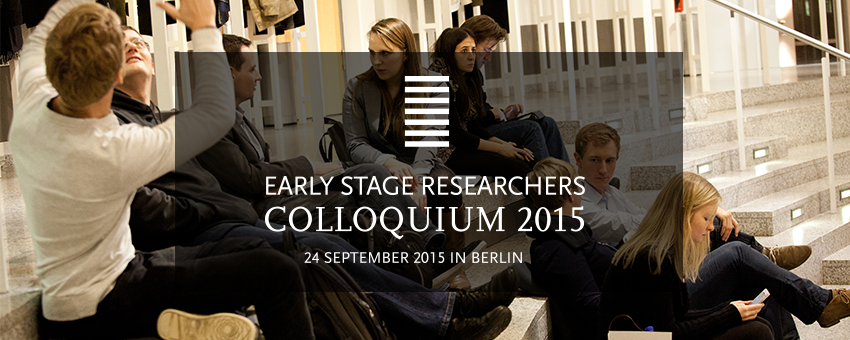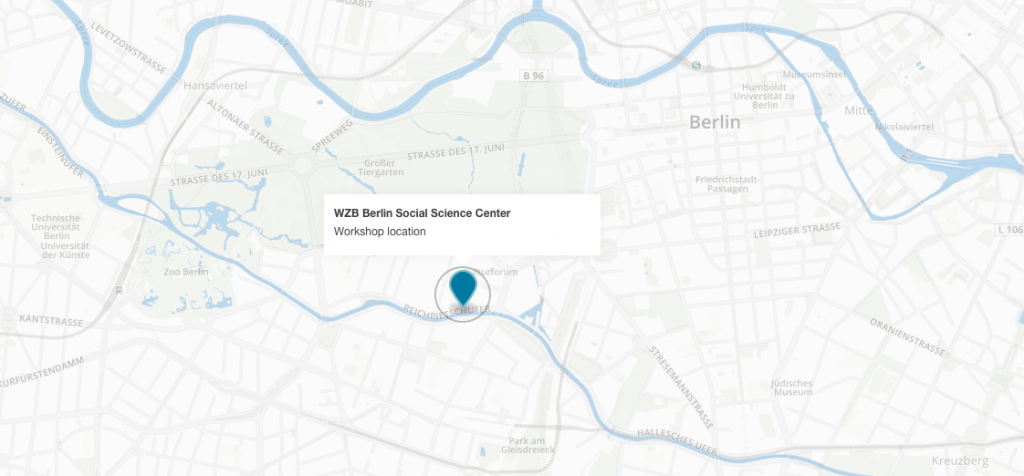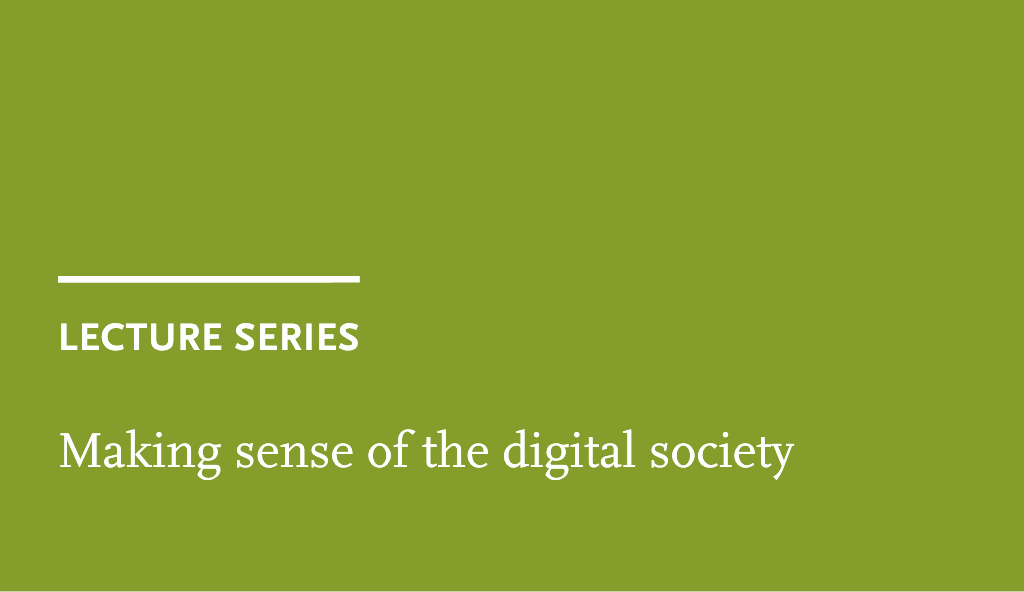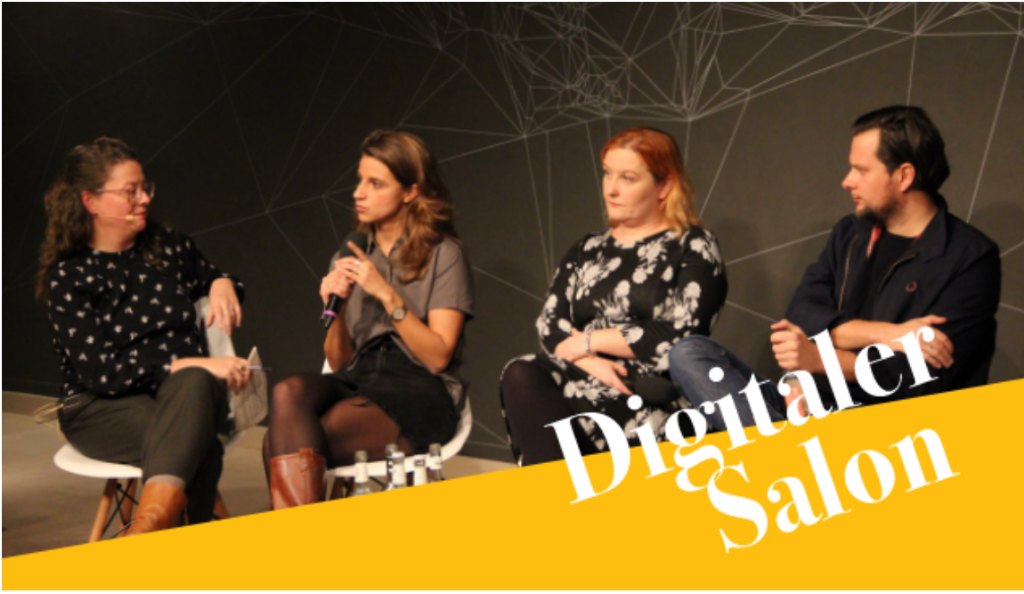Early Stage Researchers Colloquium 2015

The annual colloquium wishes to gather early stage researchers (Ph.D. candidates and post-docs) from all disciplines in order to drive forward the discussion on topics in the field of Internet research. The colloquium provides a stage for new perspectives on current issues of Internet and society.
This year’s colloquium, which will be held in Berlin on 24 September 2015 will consist of five thematically focused sessions. We cordially invite you to join us in the discussions by registring via the form below.
Programme
| 8:30 – 9:00 | Registration | |
| 9:00 – 9:15 | Welcome Address | |
| 9:15 – 10:45 | Session I: Internet and Public Governance | Session II: Digital Communication and Value Creation between Companies and the Crowd |
| 10:45 – 11:00 | Short Coffee Break | |
| 11:00 – 12:30 | Session III: Algorithmic Governance | Session IV: Interdisciplinary Research on Information Privacy, Surveillance, and Data Protection |
| 12:30 – 13:00 | Wrap-up of the morning workshops | |
| 13:00 – 14:00 | Light lunch | |
| 14:00 – 15:30 | Session V: Research and Knowledge in a Digital Age | Gikii Conference starting Thursday, 24 September, 2 pm including Friday, 25 September 2015. More information » |
Session details
Please find below the session descriptions and presentations:
Research and Knowledge in a Digital Age The Internet offers fundamentally new premises for how knowledge is created and disseminated. Research in particular is facing massive changes in the way it produces and conveys knowledge. Scientific blogs allow communicating at a faster pace, data sharing platforms enable collaboration at an intermediate stage in the research process, and new models of participation, as for example citizen science, allow volunteers to take part in the discovery process. In this stream we welcome entries from areas such as communication science, information science, economics, and science and technology studies that cover changes and emerging practices in scholarly communication, research collaboration and access to scholarly output. We also welcome entries from related fields that cover changes in knowledge creation and dissemination. Michael Huth: The interplay of physical places and digital spaces using the example of “FabLabs” |
Internet and Public Governance The use of the Internet in public services is gaining more and more attention. We therefore want to discuss structural repercussions the Internet has on fundamental ordering principles as well as on the general functions of public administrations and state institutions as regards the provision of public goods, tasks and outreach. The focus of this workshop lies less on how these technologies are rolled-out but rather on the impact and challenges these developments have on state actors and specific public governance areas. We look for approaches to e-Government and e-Services like e-justice or e-health, fight against corruption, one-stop shop approaches, smart utilities, and law enforcement; but we are also interested in research that addresses guiding ordering principles for the state institutions, like open government, transparency and privacy. We are interested in new cases, novel approaches and innovative perspectives. We especially welcome insights into areas of the global southern hemisphere, that provide an understanding of the role of contextual factors. Thomas Wischmeyer: Leviathan in the 21st Century. Information Security and the State from a Regulatory Perspective |
Interdisciplinary Research on Information Privacy, Surveillance, and Data Protection Facing the inherent complexity of information privacy and the growing interdependence between social, legal, economic, and technological aspects of privacy in the Internet age, research on information privacy, surveillance, and data protection is depending more and more on interdisciplinary cooperation. But interdisciplinarity is posing major scientific challenges in itself. In the workshop, we want to ask which theoretical foundations and research approaches are able to bridge the gap between the disciplines involved. How can we create a mutual understanding between social, legal, economic, and technical sciences? What are the assumptions, scopes, and limits of theories of information privacy, surveillance and data protection, and how can we make them transparent to researchers from different disciplines? We invite perspectives from all disciplines and theoretical and empirical backgrounds to contribute to our debate on interdisciplinary information privacy, surveillance, and data protection research. During the session there will be very brief five-minute inputs by the paper givers and ample room for discussion and the generation of new ideas. Martin Degeling: Meet your Online Tracking Profiles with TrickTrack |
Algorithmic Governance Data and algorithms seem to organise and structure our communications, our purchases and financial trades, our mobility and our risk evaluations – in short: our lives in a digital society. While this governance by algorithms is increasingly getting public attention, rigorous empirical research is still scarce and fragmented. For this track, we call for papers that empirically scrutinise exemplary cases of algorithmic governance (e.g. content regulation on platforms, user profiling, predictive policing). What happens when existing rules and practices are translated into computable decisions systems? What are the normative evaluations and business interests that shape the creation of these algorithms? What kind of data is included (and what does this process exclude)? How does the proliferation of abstract quantifications and algorithmically produced knowledge relate to the conventions and assumptions that underpin our understanding of society? Sharon Bar-Ziv: Between Two Arenas: The Enforcement of Copyrights in Courts vs. Algorithmic Enforcement |
Digital Communication and Value Creation between Companies and the Crowd Given the need to become more malleable and meet the demands of the business environment of the so-called network information economy companies seek renewed organisation models particularly in the relationship with internet users. Companies are no longer players that have a linear and unidirectional dialogue with the consumer, but are part of a decentralised and complex information ecosystem with multiple players. The connected consumer requires other marketing and communication strategies. This workshop therefore focuses on different theoretical and methodological approaches in their analysis of the communication relationship between companies and the crowd in the context of digital networks. Agata Stasik: Crowdfunding: more of the same or an opportunity to radical technological, business and social innovation? In search of evidences from energy-related technological projects. |
Location

The Early Stage Researchers Colloquium 2015 will take place at the WZB Berlin Social Science Center, Reichpietschufer 50, 10785 Berlin.
______
Side Event: GiKii 2015 in Berlin
Information is where the future lives, and Gikii is the annual conference that thrives in the information world. Since the first edition in 2006, Gikii has been at the forefront of thinking about legal issues well ahead of the curve. They tackled 3D printing before the mainstream. They dissected augmented reality, robots and drones before they were cool. Gikii are the geek lawyers who mash-up popular culture, technology and law. We warmly invite you to join us and our guests for the 10th GikII workshop, taking place on 24 and 25 September in Berlin. Please find more information here.
DIGITAL SOCIETY LECTURES
This high-profile lecture series thrives to develop a European perspective on the processes of transformation that our societies are currently undergoing.
DIGITALER SALON
Once a month we publicly discuss the impact of digitalisation on the society. Therefore we invite special guests and engage in a dialogue with the audience.
NEWSLETTER
Be the first to learn about our new events and exciting research results.

